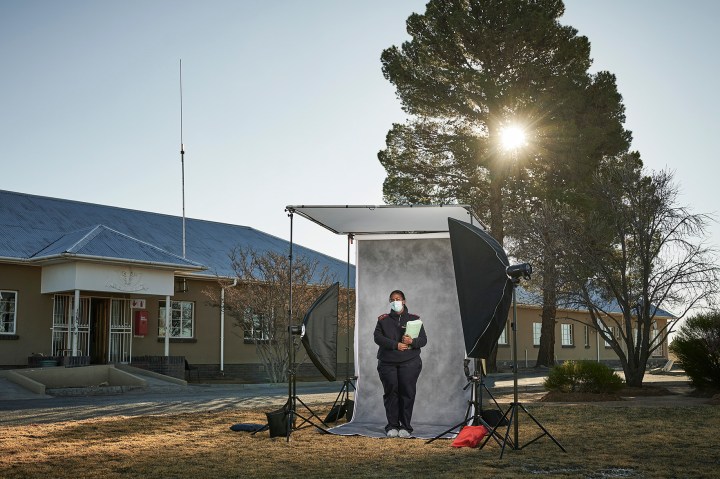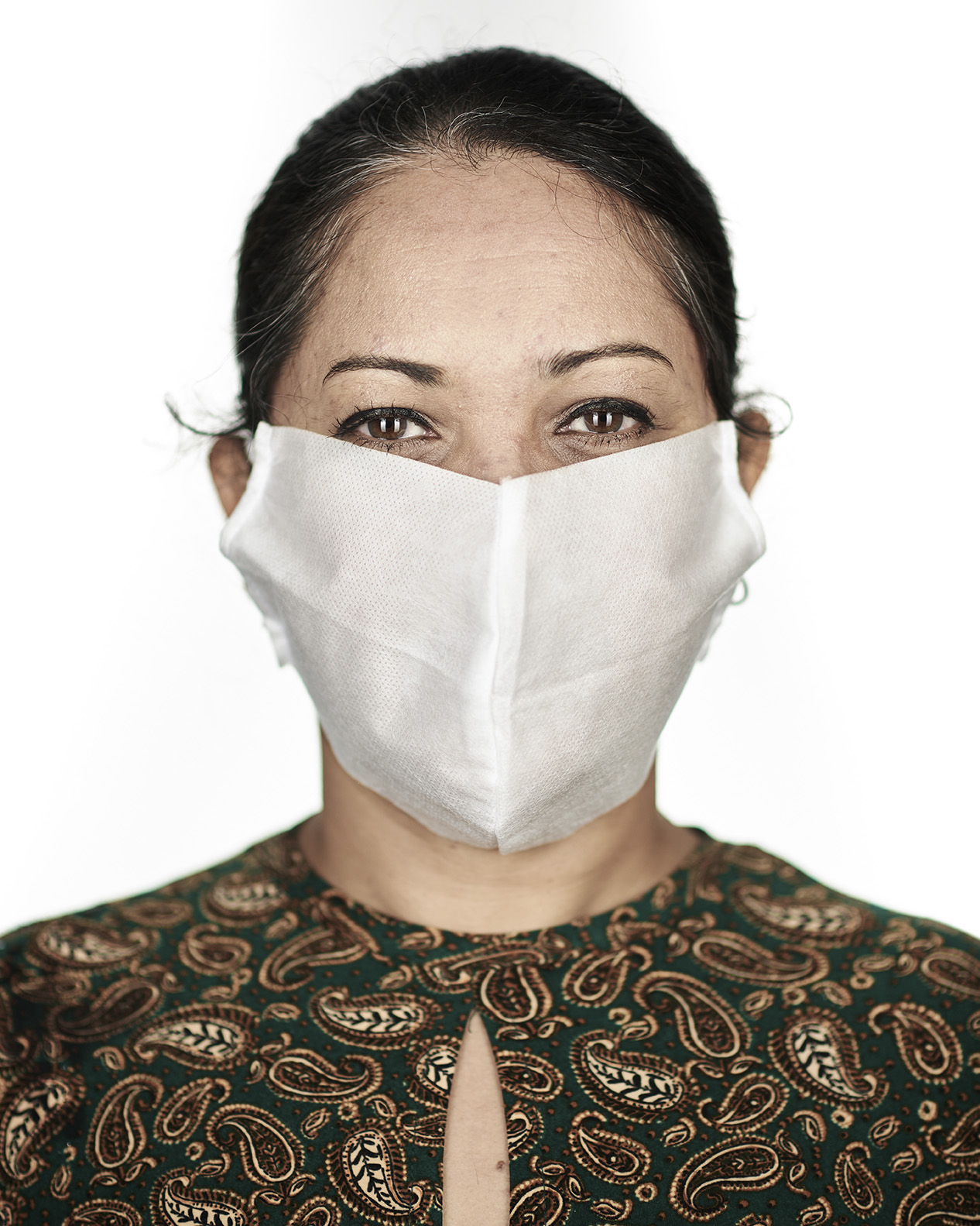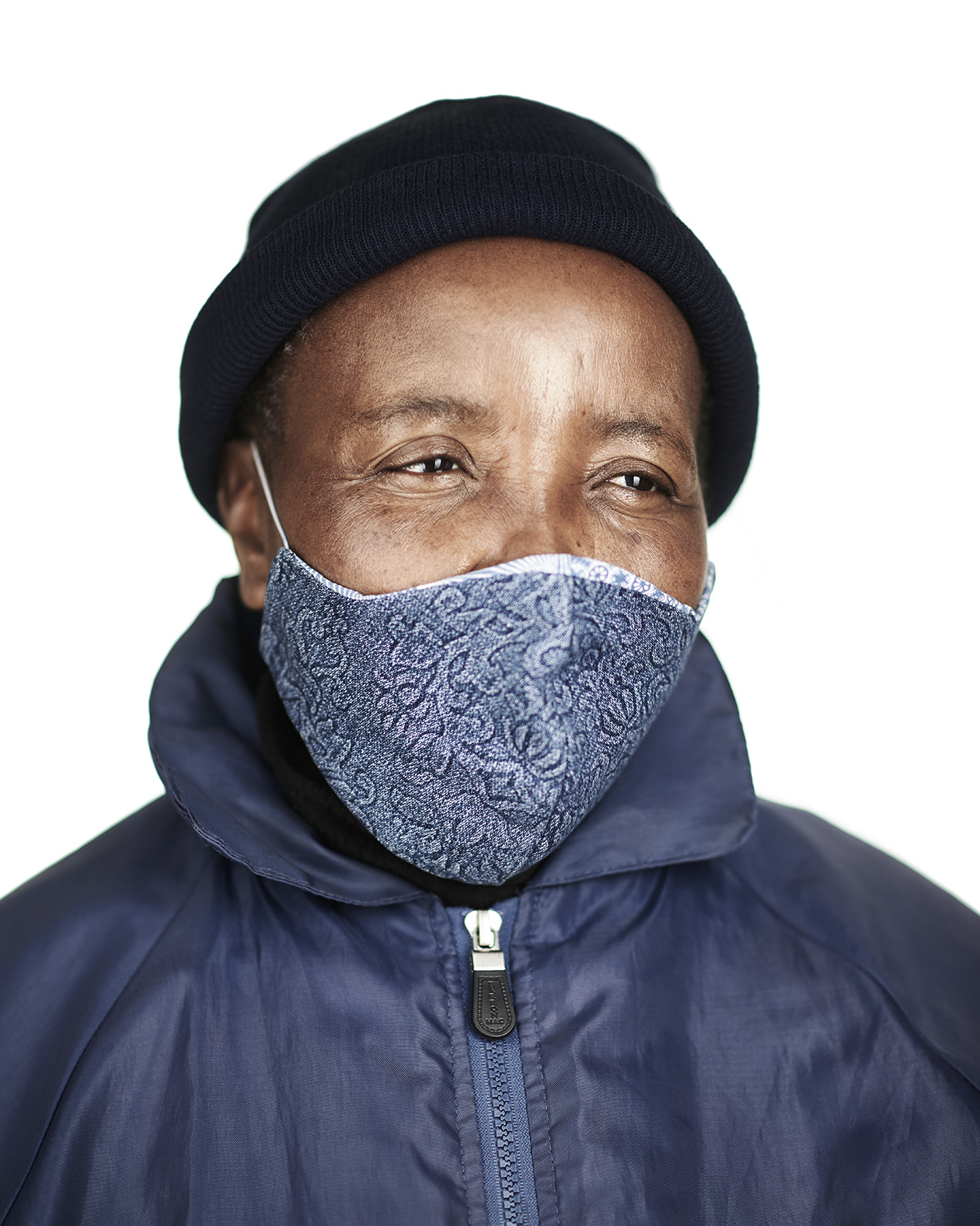Humans of Covid-19
Modimolle doctor: ‘Fear, bravery, altruism, selfishness, hope and despair have all been on display’

Maverick Citizen this week shares the stories of 26 workers who have been at the frontline of the Covid-19 response. These men and women work in health facilities in the nine provinces, some as doctors, others as nurses and some as mortuary workers, cleaners and porters. Journalist Nomatter Ndebele and photographer Thom Pierce undertook the challenging task of crisscrossing the country, at times under tight lockdown regulations, to document the stories of these incredible people who do not view themselves as heroes. In the third episode they go from KwaZulu-Natal to the Northern Cape to the Free State.
Read Episode 1 here and Episode 2 here.
Niki Singh: Occupational therapist, KwaZulu-Natal

Nikki Singh, Durban, KwaZulu-Natal. (Photo: Thom Pierce)
“Being an independent practitioner meant that I had to do my own research into appropriate protocols and guidelines to be instituted so that I could keep on providing services to my patients without putting them or myself at risk of infection.”
Recovering from a traumatic injury is a process. Therefore many of Niki Singh’s patients are with her for an extended period, and the relationship evolves from simply that of patient and caregiver. For most of her patients, Singh plays the role of confidante, motivator and friend.
Ashley Steyn: Professional nurse, Northern Cape

Ashley Steyn, Fraserburg, Northern Cape. (Photo: Thom Pierce)
“I think my biggest personal challenge is my fear: fear of missing a sign or symptom in a patient because they were not honest when being questioned, or simply because of working too fast so that the patient can leave the facility to minimise the number of patients in the waiting room.”
Fraserburg is a town in the Northern Cape where everybody knows one another and there is only one main road that goes in and out of the little town. It has not recorded any positive cases as yet. Ashley Steyn and her colleagues are on high alert, facilitating numerous screening sessions both in the community and in the community clinic.
Memmeng Mokoena: Community healthcare worker, Free State

Memmeng Mokoena, Sedibeng, Free State. (Photo: Thom Pierce)
Community healthcare workers (CHWs) in South Africa have always been the backbone of the primary healthcare system. It is they who bring healthcare services to the masses of this country who are out of the reach of the public healthcare system.
Unsurprisingly, CHWs across the country have heeded the call to fight the Covid-19 pandemic. One such healthcare worker is 52-year-old Memmeng Mokoena who lives and works in Matlwangtlwang township, in Steynsrus in the Free State.
Over the past couple of months Mokoena has visited hundreds of people in her community, conducting door-to-door visits to educate people about Covid-19.
“When the virus broke out, the Department of Health sent a representative to our clinic and they gave us information about the virus. They taught us what it was, how it spread and how people could protect themselves from being infected. Once we understood what we were dealing with, we had to go out into the community and educate them,” she explained.
The power of CHWs lies in their ability to reach people in their homes and give them information that they may not ever get otherwise. Through the CHW programme hundreds of South Africans have been educated about various elements of Covid-19, such as which symptoms to look out for, the importance of wearing a mask, sanitising frequently and of course social distancing.
“We are still providing our usual services such as seeing to pregnant women and making sure people adhere to their treatment. The only difference is that we do everything outside in order to maintain social distancing protocols,” she said.
Above and beyond their normal duties, CHWs have also been trained to do screening in communities. “We look out for signs and symptoms as we were taught, and if we find someone we have reason to worry about we refer them to a clinic for further testing. Of course where we find one person with symptoms it is imperative that we screen everybody in the household.”
As is the case for many healthcare workers on the frontline, their work has not been without challenges. Mokoena and her colleagues have faced high levels of stigmatisation from the community. “Sometimes people will see us coming and they will say, ‘Here come the Covid-19 people, these are the people who have this virus.’ Other people refuse to let us into their yards.”
Still, Mokoena remains undeterred and maintains a positive outlook.
“For me, this pandemic is the same as any other one we’ve faced as a country, be it HIV/Aids or TB. Our responsibility to the people is to give them the correct information, to encourage them to accept their diagnoses and, more than anything, it is to encourage them to be positive.”
Phetho Mangena: Doctor, Pietersburg Hospital, Limpopo

Phetho Mangena, Polokwane, Limpopo. (Photo: Thom Pierce)
When we meet Dr Phetho Mangena he is giving a Covid-19 training workshop to healthcare professionals at the Modimolle TB Hospital. At the onset of the pandemic, Mangena, a nephrologist, had to shift his focus in order to lead the Covid-19 clinical team at Pietersburg Hospital.
As the team leader, Mangena was tasked with sharing his knowledge of Covid-19 with the workers who would be staffing the Covid-19 wards at Modimolle Hospital.
Modimolle Hospital is two hours away from Polokwane. The facility was previously built as a specialised hospital where TB patients were treated. After a change in regulations, TB treatment was decentralised and the facility remained empty for a while. In an effort to capacitate the province during the Covid-19 pandemic, it was decided that Modimolle would be repurposed as an isolation facility for Covid-19-positive patients.
While Mangena has been involved in hosting workshops to capacitate healthcare workers at Modimolle, he also played a crucial role in educating support staff at Pietersburg Hospital. Cleaners at the facility attribute their ability to turn up for work without fear to the doctor’s efforts. One cleaner says Mangena may have single-handedly averted the huge staff crisis that was precipitated due to fear and misinformation about the virus. Because he made the time to educate and engage support staff, they realised that they could still do their work and protect themselves.
For Mangena, this pandemic illustrated how the onset of a crisis truly reveals human nature.
“Fear, bravery, altruism, selfishness, hope and despair have all been on display,” he said.
Mangena also spoke very candidly about the losses he suffered during this time.
“I’ve lost patients to Covid-19, including several relatives of friends and colleagues. It is a different pain when you lose a patient who is someone you know. It is like letting down your friend when [they] need [you] the most,” he said.
Even faced with these hard losses, Mangena presses on every day. He attributes the ability to fight another day to the support and motivation he receives from his family.
Karla Bezuidenhout: Doctor, Northern Cape

Karla Bezuidenhout, Kimberley, Northern Cape. (Photo: Thom Pierce)
When Dr Karla Bezuidenhout first heard about the coronavirus outbreak on the news, she had no way of knowing what a huge job lay ahead for her and her team at Kimberley Hospital in Kimberley. The doctors had no choice but to get ready for the coming storm. Through many meetings the team started developing protocols, and discussed at length how they could best protect healthcare workers. Naturally, the hospital experienced growing pains, from figuring out how to manage infection control in a hospital to prioritising the safety of nurses who had to use public transport to get to and from work.
Bezuidenhout, a nephrologist, dedicated a lot of time to making sure that her colleagues felt protected and valued. This was even more important at a time when anxieties were at an all-time high. “What is important for me, even without the pandemic, is that people enjoy working here, that they learn and grow. When you support people in that way, it translates to good patient care,” she explained.
The onset of the pandemic became a lesson in teamwork, in valuing people’s contribution and looking out for one another.
Even though Bezuidenhout and her team have worked long and arduous hours, her commitment to saving lives knows no bounds. Instead of complaining about the number of patients they’ve had to see, her biggest worry is that they still aren’t seeing enough people. “I am just so worried that people are not getting to us. What if they are dying out there?”
Her role during the pandemic was more than just being a doctor. “It’s about being a doctor, and a manager and a policeman,” she said.
In all of this, Bezuidenhout is adamant that without the support of her team, they would never have seen as many recoveries as they have. “I cannot over-emphasise their part. There hasn’t been a single complaint. The junior doctors haven’t been on leave this year. People have truly gone above and beyond [the call of duty], whether they are pushing patients in wheelchairs or dealing with mountains of admin,” she said.
Despite all of this work, the doctors have found the patience and strength to motivate their patients daily. “We just keep saying to them, ‘Keep breathing, keep fighting’.” DM/MC
Read Episode 1 here and Episode 2 here.
Nomatter Ndebele is a writer who specialises in human interest stories. She is passionate about people and telling their stories in a way that inspires human connection. When she isn’t writing she does work in access to human rights and youth development. Nomatter has been a finalist in the Discovery Health Journalism Awards. Thom Pierce is a British photographer, currently based in Johannesburg, South Africa. His work explores the line between documentary, art and portrait photography to engage with humanitarian issues; through photographic essays, installations and exhibitions. He is passionate about human rights and using photography as a tool to connect an audience to issues of injustice. Over a period of years, his work has developed to become primarily focused on the art of activism through photography. He has won several awards for his work and has previously been chosen as a finalist in the Magnum Photography Awards and selected for the Taylor Wessing Photographic Portrait Prize Exhibition at the National Portrait Gallery in London.
"Information pertaining to Covid-19, vaccines, how to control the spread of the virus and potential treatments is ever-changing. Under the South African Disaster Management Act Regulation 11(5)(c) it is prohibited to publish information through any medium with the intention to deceive people on government measures to address COVID-19. We are therefore disabling the comment section on this article in order to protect both the commenting member and ourselves from potential liability. Should you have additional information that you think we should know, please email [email protected]"





 Become an Insider
Become an Insider